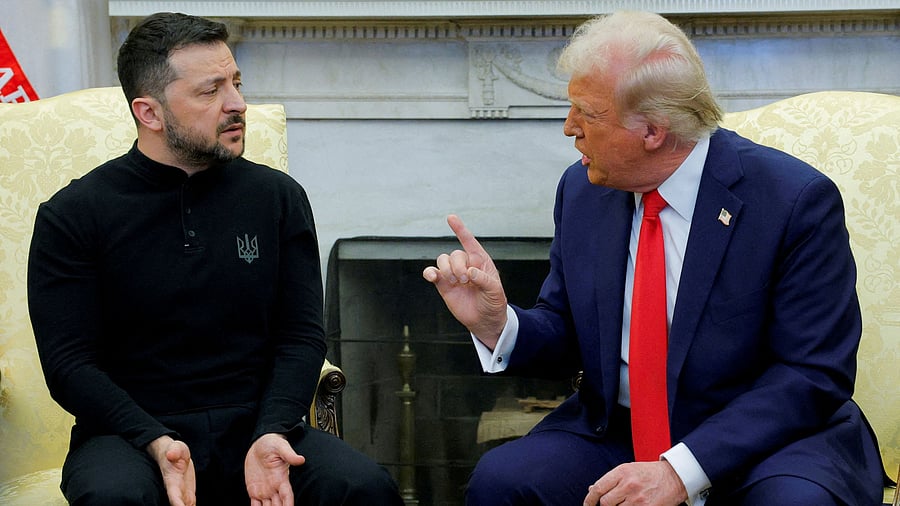
US President Donald Trump meets with Ukrainian President Volodymyr Zelenskyy at the White House in Washington, DC, February 28, 2025.
Credit: Reuters Photo
Diplomacy, at its core, has always relied on measured discussions, discreet negotiations, and carefully crafted messaging. Historically, the most significant agreements have been forged behind closed doors, away from media scrutiny and public spectacle. However, the current approach, where global leaders engage in overt power plays and performative diplomacy, undermines not only the credibility of their positions but also the strength of the nations they represent.
The recent meeting between US President Donald Trump, his deputy J D Vance, and Ukrainian President Volodymyr Zelenskyy was less a diplomatic engagement and more a unilateral, optics-driven approach to diplomacy. Trump’s and Vance’s attempt to impose a settlement on their terms exposed their inability to navigate complex negotiations. Their actions have not demonstrated strength but weakness. Diplomacy is about persuasion, incentives, and shared interests—not coercion. Rather than demonstrating dominance, they showed desperation, failing to acknowledge that sustainable peace cannot be dictated—it must be mutually constructed.
Unlike past diplomatic efforts that sought enduring solutions, the modern approach is reactionary, dictated by public perception rather than strategic foresight. Decisions made during World War II and its aftermath, although flawed, demonstrated a level of maturity, pragmatism, and long-term vision that is lacking in today’s world order. The post-war settlements—whether at Yalta, Potsdam, or in the formation of global institutions—were handled with an understanding that diplomacy is about balancing power, not grandstanding. Today, statecraft has been reduced to a media event, where the goal appears to be immediate optics rather than lasting solutions.
Flawed approach
A fundamental flaw in the current approach is the belief that one or two leaders can unilaterally resolve conflicts of global significance. The ongoing war against Ukraine, much like past conflicts, requires a collective and coordinated effort. Yet, recent attempts at brokering a settlement have been marked by unilateral demands rather than a genuine multilateral strategy.
Even if Trump and Vance had succeeded in forcing a settlement, it would not have brought lasting peace. At best, it would have resulted in a fragile ceasefire that could unravel at the slightest provocation. Imposed settlements breed resentment, making any minor incident—whether a perceived diplomatic slight or a border skirmish—a potential trigger for renewed conflict.
Sustainable peace requires a broader vision, one that considers the historical grievances, security concerns, and economic realities of both sides. It demands an approach that includes multiple stakeholders, ensuring agreements are not only signed but also respected and upheld over time.
EU Foreign policy chief Kaja Kalias’ remark following the White House meeting—that “the free world needs a new leader”—was more than an observation; it was an indictment of the state of global leadership. The war continues not just because of the directly involved nations but because there is no coordinated global effort to resolve it effectively.
In past eras, global leadership was defined by strategic alliances, long-term planning, and the ability to command respect on the world stage. Today, it seems to be dictated by immediate political gain, domestic optics, and reactionary decision-making. The result is a fragmented approach to diplomacy, where no single power has the vision, credibility, or influence to drive a real resolution.
If the world is to move beyond cyclical conflicts, it requires leadership that understands diplomacy not as a series of media opportunities but as a carefully orchestrated, long-term process. It needs leaders who prioritise stability over short-term victories, who build coalitions rather than grandstanding for cameras.
True diplomacy has never been about dominance; it has always been about wisdom, patience, and the ability to craft solutions that endure. The current approach, reliant on singular leadership and public posturing, is fundamentally flawed. Unless global leaders return to the principles of strategic and inclusive diplomacy, conflicts will continue to be paused rather than resolved. The free world does not just need a new leader—it needs a new approach to leadership altogether.
(The author is a UK-based writer)
Disclaimer: The views expressed above are the author's own. They do not necessarily reflect the views of DH.